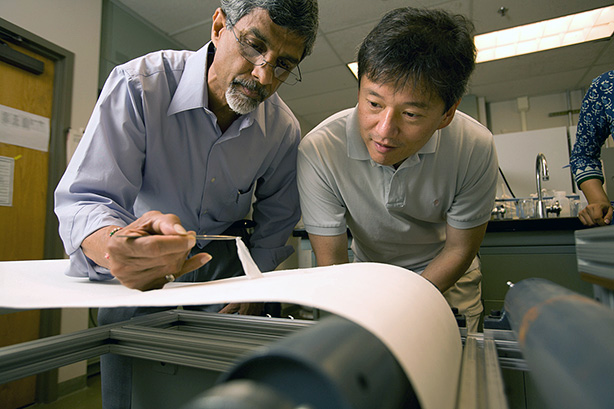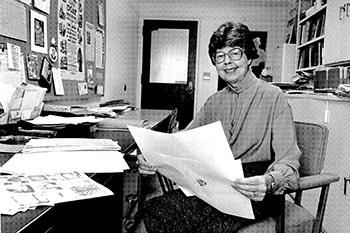
Anil Netravali, left, collaborates with Professor Yong Joo on biodegradable air and water filters. Netravali, who studies fiber-reinforced composites and green materials, now holds the Jean and Douglas McLean Professorship in Fiber Science & Apparel Design. Photo: University Photography file photo.
Estate gift establishes Jean and Douglas McLean Professorship
In 26 years with the College of Human Ecology, Jean McLean traveled all around the state, teaching county educators and consumers about the synthetic fabrics of the day -- polyester, nylon and acrylic. Nationally, she helped develop care labels that began to appear on clothing in the 1970s.

Jean McLean became an assistant professor of textiles and clothing in 1959; she retired in 1985. Photo: Division of Rare and Manuscript Collections, Cornell University Library.
Although she died last year, her influence will carry on through the new Jean and Douglas McLean Professorship in Fiber Science & Apparel Design (FSAD), which has been awarded to professor Anil Netravali, who studies fiber-reinforced composites and green materials. The endowed professorship is part of a $3.6 million bequest from the McLean estate.
"Jean really believed in the mission of the college, and through this bequest, she will continue to make a difference," says senior associate dean and FSAD professor Kay Obendorf, M.S. '74, Ph.D. '76.
McLean became an assistant professor of textiles and clothing in 1959, joining what was then the College of Home Economics. Her interest in teaching consumers about fabric led her to become the Department of Textiles and Clothing's program leader for Cornell Cooperative Extension.
In Ithaca, she would often be seen driving her Redbird sports car, which caught the attention of Doug McLean '49, who owned a glassware shop and recording studio downtown. They married, and remained deeply connected to Cornell -- Doug's parents, True McLean '22 and Kathryn Blanche Brooks McLean '22, were Cornellians as well -- which motivated Jean and Doug to make a bequest, says Lorna Craig '48, Doug's sister. "It seemed like the right thing to do," she says.
Netravali joined FSAD in 1987, two years after McLean retired. Though her work centered on fabric and clothing, she and Netravali shared an interest in sustainability. In the 1970s, McLean taught energy conservation, demonstrating how textiles could be layered in clothing or provide thermal comfort as window coverings.
"This would fit under what we're doing in sustainability, though it had a different name then," says Obendorf.
In his lab, Netravali has developed fiber-reinforced composites that can be used in manufacturing automobile parts, packaging, housing or transportation panels. His research uses sustainable materials from plants, including soybeans, corn, potatoes and rice, to create environmentally friendly resins and composites.
To reduce apparel waste, Netravali recently designed a "fiberizer," a machine that breaks down textile fragments to create material that can be used in pillows, packaging and stuffed animals. Funded by the U.S. Environmental Protection Agency and Cornell's Atkinson Center for a Sustainable Future, the device helps to ensure the fabric can be repurposed when clothing reaches the end of its life cycle, Netravali says.
Netravali plans to use the professorship to support collaborative projects with researchers who visit Cornell from outside the U.S. "It is a great honor to have this professorship," he says, "and the funds will give me the opportunity to do research that wasn't possible before."
Sherrie Negrea is a freelance writer.